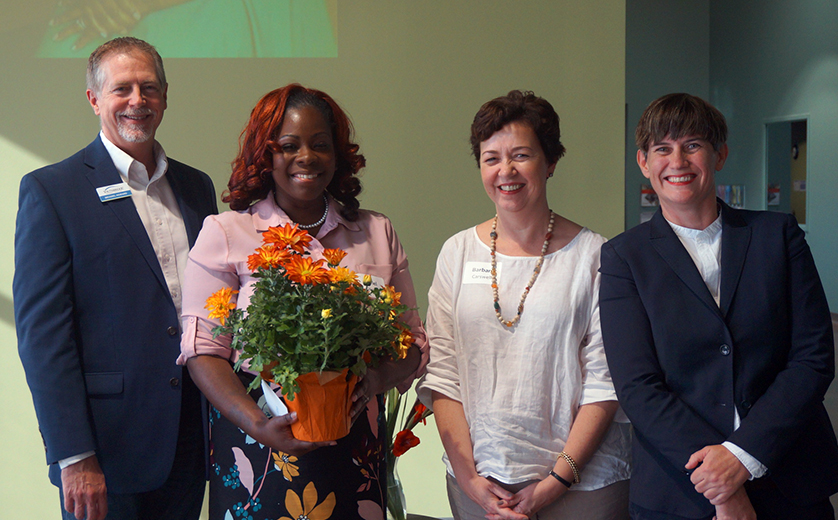Arriel Biggs started a class to help children learn business skills because she thought it would be fun. After participating in a Brown School-sponsored competition in social entrepreneurship, she realized it could be much more.
“It opened my eyes to a lot of things,” Biggs said. “The biggest thing was that a non-profit can make a profit. I can earn a salary, support my family and create jobs for the community while helping kids learn at the same time.”
Biggs is the founder and CEO of Young Biz Kidz, one of seven winners in the 2016-17 Social Enterprise Innovation Competition, a seed funding competition for social ventures hosted by Heather Cameron, the Brown School Michael B. Kaufman Professor of Practice in Social Entrepreneurship, along with the university’s Skandalaris Center and the Mission Center, L3C.
The purpose of the SEIC is to engage St. Louis students and community experts to work toward entrepreneurial solutions in areas such as youth development, aging, health and housing. Innovators from the St. Louis region as well as students from Washington University, Saint Louis University and the University of Missouri–St. Louis took part; about half were Brown School students.
“These SEIC winners were selected over a yearlong process of working on their revenue-generating social business ideas,” Cameron said.
In addition to Young Biz Kidz, other winners were:
- The Bloom Café, a social enterprise café founded by Paraquad, an organization that empowers people with disabilities to live and work independently. The café will provide training, paid internships and job placement for people with disabilities.
- Dream Builders 4 Equity, which provides at-risk youth with the opportunity to own real estate in low-income, distressed communities by attending life- and job-skill courses and contributing to community development.
- Hope Creates, which aims to improve the lives of youth and young adults in recovery from addiction through expressive arts, occupational therapy and the development of basic professional skills.
- Johego, which uses cutting-edge data science and grassroots community organizing to prioritize, collect and verify information that is needed most by social service professionals. It delivers this information in the form of a free smartphone application and coming soon, a free browser-based web application.
- Life Binder, an organizational toolkit for parents to teach their autistic teens to manage their own support networks and successfully transition to independent living after high school.
- WearableArt4Peace, a line of clothing and jewelry to fund PEACE Weaving Wholeness, a non-profit that focuses on women’s health.
“Developing self-sustaining ways to make an impact on communities is so important and it’s critical to the work we do as a School,” said Mary M. McKay, Neidorff Family and Centene Corporation Dean of the Brown School. “We are so pleased to see the level of creativity and commitment these entrepreneurs displayed.”
The competition began in fall 2016, with workshops on writing a “minimum viable product” proposal. In January 2017, judges from the university and the community selected 12 projects to go forward. Students in Cameron’s Social Entrepreneurship class helped with researching competitors and understanding client needs.
One of those students, Varsha Ranjit, MPH ´17, said the experience provided her with hands-on business skills. “As a public health student, I enjoyed the glimpse I got into the business sector,” she said. “I was really exposed to the effort and passion that is behind enterprises that aim to challenge the status quo.”
Some Brown School and Olin Business School students also had the chance for paid internships during the summer to help the innovators with their prototypes and further develop the business plans. In the summer, the finalists wrote business impact plans and developed prototype businesses.
Cameron said the competition aims to discover and accelerate programs that can have a large impact on the community and be scaled to other locations. “We are focusing on projects that have a revenue-generating aspect to them. You can be non-profit, for profit or hybrid, but you must be working on a revenue stream and not be solely relying on grants. We want to help people create more resources so they can innovate.”
Awards were funded by Arch Grants, the Missouri Foundation for Health and YouthBridge Community Foundation.
“It was a really good process,” said Biggs. “Young Biz Kidz came up with a business plan and then ran a test with 10 children. Now I know what I need to do, what works and what doesn’t work.”
Biggs’ original inspiration was her son, Mikey, now 10, who made more than $1,000 selling lemonade. Mikey now helps her teach the basics of entrepreneurship to other children, offering hands-on experience selling their own products. She said the $6,000 award Young Biz Kidz received from the SEIC will be used to design a class workbook and provide seed money for a lemonade-sales annual fundraiser.
In 2018, the SEIC is kicking off a new competitor cohort and introducing video lessons so more people can take part at their own pace. For those interested in learning more and being part of the competition, program applications will be accepted until December 10, 2017 at seic.wustl.edu.
